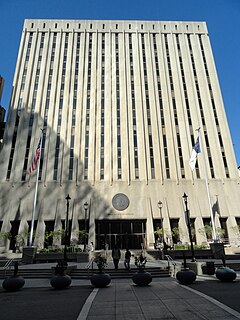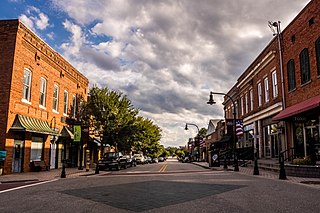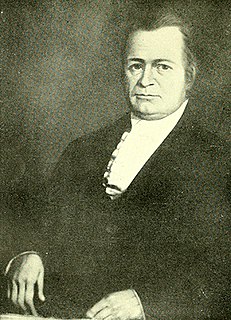
North Carolina is a state in the Southeastern region of the United States. The state is the 28th largest and 9th-most populous of the 50 United States. It is bordered by Virginia to the north, the Atlantic Ocean to the east, Georgia and South Carolina to the south, and Tennessee to the west. Raleigh is the state's capital and Charlotte is its largest city. The Charlotte metropolitan area, with a population of 2,595,027 in 2020, is the most-populous metropolitan area in North Carolina, the 21st-most populous in the United States, and the largest banking center in the nation after New York City. The Raleigh-Durham-Cary combined statistical area is the second-largest metropolitan area in the state and 32nd-most populous in the United States, with a population of 2,043,867 in 2020, and is home to the largest research park in the United States, Research Triangle Park.

Raleigh is the capital of the state of North Carolina and the seat of Wake County in the United States. It is the second-most populous city in North Carolina, after Charlotte, tenth-most populous city in the Southeast, 41st-most populous city in the U.S., and the largest city of the Research Triangle metro area. Raleigh is known as the "City of Oaks" for its many oak trees, which line the streets in the heart of the city. The city covers a land area of 147.6 square miles (382 km2). The U.S. Census Bureau counted the city's population as 474,069 in 2020. It is one of the fastest-growing cities in the country. The city of Raleigh is named after Walter Raleigh, who established the lost Roanoke Colony in present-day Dare County.

Wake County is located in the U.S. state of North Carolina. In 2021, the population was 1,150,204, making it North Carolina's most populous county. From July 2005 to July 2006, Wake County was the 9th fastest-growing county in the United States, with the town of Cary and the city of Raleigh being the 8th and 15th fastest-growing cities, respectively.

Franklin County is a county located in the U.S. state of North Carolina. As of the 2020 census, the population was 68,573. Its county seat is Louisburg.

Apex is a town in Wake County, North Carolina, United States. Apex encompasses the community of Friendship at its southern border. In 1994, the downtown area was designated a historic district, and the Apex train depot, built in 1867, is designated a Wake County landmark. The depot location marks the highest point on the old Chatham Railroad, hence the town's name. The town motto is "The Peak of Good Living".

Garner is a town in Wake County, North Carolina, United States and a suburb of Raleigh. The population is 31,159 as of the 2020 Census. The city limits are entirely within Wake County, though portions of unincorporated Wake County, as well as the Cleveland community in northern Johnston County, have Garner mailing addresses. It is part of the Research Triangle region of North Carolina and serves as a bedroom community for the region.

Wake Forest is a town in Franklin, Granville and Wake counties in the U.S. state of North Carolina; located almost entirely in Wake County, it lies just north of the state capital, Raleigh. The population was 30,117 at the 2010 census, up from 12,588 in 2000. The U.S. Census Bureau estimates the city's population to be 47,601 as of April 1, 2020. In 2007, the town was listed by Forbes magazine as the 20th fastest growing suburb in America, with a 73.2 percent increase in population between 2000 and 2006. Wake Forest was the original home of Wake Forest University for 122 years before it moved to Winston-Salem in 1956.

Cary is a town in Wake County and Chatham County, North Carolina. Cary is part of the Raleigh-Cary, NC Metropolitan Statistical Area. As of the 2020 Census, the population of Cary was 174,721, making it Wake County's second-largest municipality, the seventh-largest in North Carolina, and the 150th largest in the United States.

William Woods Holden was an American politician who served as the 38th and 40th Governor of North Carolina. He was appointed by President Andrew Johnson in 1865 for a brief term and then elected in 1868. He served until 1871 and was the leader of the state's Republican Party during the Reconstruction Era.
John Haywood was an American politician, who was the longest-serving North Carolina State Treasurer.
William Johnston Dawson was a U.S. Congressman from the state of North Carolina from 1793 to 1795 and a member of the North Carolina House of Commons.

Paul Yelverton Coble served one term as Mayor of Raleigh, North Carolina from December 1999 to December 2001. Coble served on the Wake County Board of Commissioners from 2006 to 2014, and served as chairman of the board from 2010 to 2012. In 2015, he became the Legislative Services Officer for the North Carolina General Assembly.

Calvin Jones was a North Carolina physician and was among the group of founders of the North Carolina Medical Society. He served from 1802 to 1832 as a trustee of the University of North Carolina. Jones was also elected to the North Carolina House of Commons and as the Mayor of Raleigh, North Carolina (1807–1809). In 1817 and 1819 he was Grand Master of Masons in North Carolina.

The Mordecai House, built in 1785, is a registered historical landmark and museum in Raleigh, North Carolina that is the centerpiece of Mordecai Historic Park, adjacent to the Historic Oakwood neighborhood. It is the oldest residence in Raleigh on its original foundation. In addition to the house, the Park includes the birthplace and childhood home of President Andrew Johnson, the Ellen Mordecai Garden, the Badger-Iredell Law Office, Allen Kitchen and St. Mark's Chapel, a popular site for weddings. It is located in the Mordecai Place Historic District.
William White (1762–1811) was the second North Carolina Secretary of State, serving from 1798 until 1811.
The mayor of Raleigh is the mayor of Raleigh, the state capital of North Carolina, in the United States. Raleigh operates with council-manager government, under which the mayor is elected separately from Raleigh City Council, of which they are the eighth member.

The Raleigh mayoral election of 2011 was held on October 11, 2011, to elect a Mayor of Raleigh, North Carolina for a two-year term. Incumbent Mayor Charles Meeker announced in April 2011 that he would not run for a sixth term. The election was officially a non-partisan contest, but outgoing Mayor Meeker was well known as a Democrat. Meeker endorsed candidate Nancy McFarlane, who is politically unaffiliated, to succeed him. She won the election with 61 percent of the vote, making a runoff unnecessary.
The following is a timeline of the history of the city of Raleigh, North Carolina, USA.

The 2019 mayoral election in the city of Raleigh, North Carolina, was held on Tuesday, October 8, 2019. Former City Council member Mary-Ann Baldwin placed first in the election, followed by attorney Charles Francis. Although Baldwin did not receive a majority of the vote, Francis declined to seek a runoff, leaving Baldwin elected as the city's next mayor.
The North Carolina General Assembly of 1836–1837 met in Raleigh from November 21, 1836 to January 23, 1837. The assembly consisted of the 120 members of the North Carolina House of Commons and 50 senators of North Carolina Senate elected by the voters in August 1836. During the 1836 session, the legislature created Davie County, but it was not until 1842 that Davie County began sending delegates to the General Assembly. William H. Haywood, Jr was elected speaker of the House of Commons and Charles Manley was elected clerk. Hugh Waddell was elected President of the Senate and Thomas G. Stone was elected Clerk. Richard Dobbs Spaight, Jr. was the Governor in 1835 and 1836. He was elected by the previous legislature. In 1837, the Governor of North Carolina, Edward Bishop Dudley from New Hanover County, was elected, for the first time, by the people vice the legislature. The Whigs would control North Carolina politics until 1850. While in power, their notable achievements included funding railroads and roads, public education, and State chartered banks.















